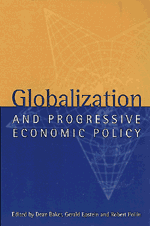Book contents
- Frontmatter
- Contents
- List of figures
- List of tables
- List of contributors
- Editors' acknowledgments
- 1 Introduction
- I The IMF, the World Bank, and neo-liberalism
- II Foreign direct investment, globalization, and neo-liberalism
- 4 Globalization, transnational corporations, and economic development: can the developing countries pursue strategic industrial policy in a globalizing world economy?
- Comment by Tamim Bayoumi
- 5 Multinational corporations in the neo-liberal regime
- Comment by Tim Koechlin
- III Globalization of finance
- IV Trade, wages and the environment: North and South
- V Migration of people in a global economy
- VI Globalization and macroeconomic policy
- Bibliography
- Index
4 - Globalization, transnational corporations, and economic development: can the developing countries pursue strategic industrial policy in a globalizing world economy?
Published online by Cambridge University Press: 04 August 2010
- Frontmatter
- Contents
- List of figures
- List of tables
- List of contributors
- Editors' acknowledgments
- 1 Introduction
- I The IMF, the World Bank, and neo-liberalism
- II Foreign direct investment, globalization, and neo-liberalism
- 4 Globalization, transnational corporations, and economic development: can the developing countries pursue strategic industrial policy in a globalizing world economy?
- Comment by Tamim Bayoumi
- 5 Multinational corporations in the neo-liberal regime
- Comment by Tim Koechlin
- III Globalization of finance
- IV Trade, wages and the environment: North and South
- V Migration of people in a global economy
- VI Globalization and macroeconomic policy
- Bibliography
- Index
Summary
Introduction
During the last quarter of this century, we have witnessed a sea change in the prevailing view on the role of the state. The earlier interventionist orthodoxy that ruled the “Golden Age of Capitalism” (1950–73) has been subjected to some severe, and in some areas fatal, criticisms, and currently the neo-liberal vision, which draws its inspirations from the old liberal world order of the 1870–1913 period, dominates. On the domestic front, the current orthodoxy seeks to restore entrepreneurial dynamism and social discipline by rolling back the boundaries of the state through budget cuts, privatization, and deregulation. At the international level, it seeks to accelerate global integration and convergence (a trend that orthodox economists believe started around 1870 but was reversed after the First World War) by reducing restrictions on the international flows of trade, direct and portfolio investments, and technology.
Yet even when considering the shift in the overall intellectual and policy atmosphere, the debate on developing country governments' policies regarding transnational corporations (TNCs) has arguably experienced the most dramatic aboutturn. (For some recent critical reviews of the literature, see Helleiner 1989 and Lall 1993, introduction). Once regarded by many commentators as agents distorting, if not actually hampering, the development of poorer nations, TNCs are now regarded by many, including even some of their earlier critics, as indispensable agents of development, promoting the integration of developing countries into the emerging network of globalized production and thus enhancing their efficiency and growth (e.g., see Julius 1990, 1994; UNCTC 1992b; Michalet 1994; Brittan 1995).
- Type
- Chapter
- Information
- Globalization and Progressive Economic Policy , pp. 97 - 113Publisher: Cambridge University PressPrint publication year: 1998
- 12
- Cited by



